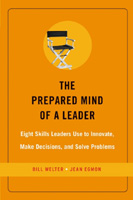 |
| ||||||||||||||||

|
The Prepared Mind of a Leader : Eight Skills Leaders Use to Innovate, Make Decisions, and Solve Problems Bill Welter and Jean Egmon
Excerpt from The Prepared Mind From the Introduction: Chance Favors the Prepared Mind "Chance favors the prepared mind" was the statement Louis Pasteur, the 19 century scientist, used to describe his remarkable ability to invent and innovate across a complex set of problems. When you look at Pasteur's accomplishments - from his studies of crystallization and fermentation that aided industries ranging from dairying to silk-making to his work with germs and microorganisms that opened up whole new fields of scientific inquiry -- you can see that he was truly ready for chance to "happen" to him. Pasteur's observation on the significance of a "prepared mind" was in the back of our minds as we looked at organizational successes and failures across a variety of industries, economic conditions and business environments and observed the behaviors of the leaders of these organizations. We saw consistencies, and we wondered what the basis for these consistencies was and how they developed. What was going on beneath the surface of leader behaviors? What were they thinking or, in some cases, not thinking, as they made their decisions? We believe "the prepared mind" is the hallmark of 21 century leaders who are remarkable in their ability to sense, make sense, decide and act across a complex set of conditions. We also believe that "the prepared mind" is not a matter of chance. It is a matter of intentional preparation and that is the purpose of this book: to help you build the skills of Prepared Mind leadership. Prepared Mind Leadership In our working definition of Prepared Mind leadership, we see leadership as the practice of continuously envisioning opportunities for growth within complex, dynamic environments, built upon core principles the organization is committed to sustaining and using as the basis for value delivered to all of its stakeholders. Implied in our definition is that leaders, no matter where they are in the organization, are strategists in terms of making opportunities explicit and knowing why and when and how to move into and navigate the various problems and opportunities they face. You can be an individual contributor or a "box on the organizational chart" and still act as a leader in your organization, or fail to do so. Prepared Mind leadership is not limited by formal roles. In fact, the more we looked at acts of leadership, the more we realized the power, the responsibility and the risk of "acting outside the narrow confines of your job description." Furthermore, in this era of continuously shifting boundaries and relationships, and shorter job and strategy shelf lives, successful people learn to do just that, for their own good and for the good of their organizations. It's an organizational requirement that you perform your job and perform it well. But leadership is a voluntary act. Whether you hold a position of leadership in the traditional sense or decide that you are someone who will choose to "step outside the strict confines of their job description," the intent of this book is to help you develop the skills of a Prepared Mind leader. The Skills of a Prepared Mind Good leadership, like so many other things in life, is seen through a combination of skills. And, like so many other things in life, you don't just "get better" at leadership; you improve your skills by regular practice. To use a sports metaphor, a good golfer has driving skills, putting skills, "rough" skills, bunker skills, and so on. He or she is only good because of practice. And as we looked at organizational successes and failures in their innovation, decision making, and problem solving, we looked for mental skills that were being used or were absent. We see eight fundamental skills delineating a Prepared Mind leader:
Find Items On Similar Subjects |
||||||||||||||||||||||||||||||
|
All prices subject to change and given in U.S. Dollars. |
All materials contained in http://www.LeadershipNow.com are protected by copyright and trademark laws and may not be used for any purpose whatsoever other than private, non-commercial viewing purposes. Derivative works and other unauthorized copying or use of stills, video footage, text or graphics is expressly prohibited. LeadershipNow is a trademark of M2 Communications, LLC. |
